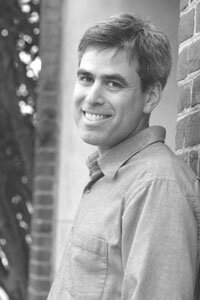FACETIME- Elevated: Haidt redefines happiness
Jonathan Haidt is serious about happiness, and he taps into science and philosophy to answer the age-old question: how should we live?
Just don't call his new work a self-help book.
The UVA psychology professor has written The Happiness Hypothesis: Finding Modern Truth in Ancient Wisdom. And he had to fight off the publisher's plan to put a smiley face on the cover.
Despite the cover tease, "Why the Meaningful Life is Closer than You Think," The Happiness Hypothesis puts a scholarly face in the self-help section.
One big difference from the how-to-find-happiness pack: "Most pop psychology books teach you it's all in your head," he says. "That's just wrong."
His advice to the unhappy: change your environment and habits. He compares people to plants that need the right conditions– water, soil, and sun– to thrive.
And he urges balance. "I learned truth is to be found on all sides– East and West, liberal and conservative, ancient and modern," he says.
By drawing on wisdom from seeming opposites, it's possible to "choose directions in life that will lead to satisfaction, happiness, and a sense of meaning," he writes.
Haidt, 42, has been pondering the meaning of life since a high school paper on Waiting for Godot plunged him into an existential depression. He pursued philosophy as an undergrad at Yale, but that didn't provide the answers he wanted, and in grad school he shifted gears into psychology. A chance conversation with a professor about morality led to his dissertation: "Moral judgment, affect, and culture, or, is it wrong to eat your dog?"
In debunking traditional thinking about morality, Haidt came up with the disgust scale. "I first found divinity in disgust," he writes in Happiness.
"The biggest misconceptions about morality," he explains, "are A, we're selfish creatures and B, that morality is learned directly from society. That is flat-out wrong."
He sees morality as a basic aspect of human nature, much like language and sexuality. "Morality is part of the design," he says.
Haidt is a positive psychologist. Unlike traditional psychology that focuses on psychopathology or on normal functions, positive psychology looks at what makes people flourish– what makes them happy and fulfilled.
"I think he's a leader," says Michael Kubovy, a colleague at UVA.
Indeed, Haidt has "discovered" a new emotion: elevation, the uplift that comes from witnessing a good deed. One of his students devised a study to measure elevation using lactating women, nursing pads, and Oprah.
And he's co-authored a book called Flourishing: Positive Psychology and the Life Well Lived.
Apparently, happiness sells, and Haidt is scheduled to appear on NBC's Today Show February 28.
"He has a topic that is of enormous interest to people," Kubovy says. "People are looking for spiritual guidance, and if that comes with the stamp of approval of science," so much the better than "what someone thought off the top of his head."
The inevitable question: Is Haidt happy?
"Yes," he replies. "The whole theme of the book is getting the conditions right. When I was younger, the conditions weren't right."
Now they are.
And he lived happily ever after.

Jonathan Haidt
PHOTO BY JEN FARIELLO#